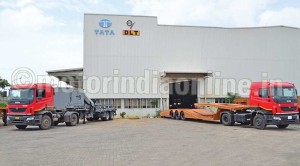 Over the last few years, traditional commercial vehicle manufacturers have been increasingly upgrading capabilities to provide fully-built solutions for the benefit of customers. The Indian market is in the process of maturing from the cowl-chassis versions to the next step of trucks with factory-built cabs, with some manufacturers already offering completely-built vehicles with various applications such as trailers, tippers, bulkers, and many other customized solutions.
Over the last few years, traditional commercial vehicle manufacturers have been increasingly upgrading capabilities to provide fully-built solutions for the benefit of customers. The Indian market is in the process of maturing from the cowl-chassis versions to the next step of trucks with factory-built cabs, with some manufacturers already offering completely-built vehicles with various applications such as trailers, tippers, bulkers, and many other customized solutions.
Tata Motors was one of the first CV OEMs to attain a ‘complete solution provider’ status when it entered the fully-built vehicle (FBV) segment in 2005, importing trailers through Tata International Ltd. (TIL), the trading wing of the Tata Group. In 2006, TIL forged a joint venture agreement with Dutch Lanka Trailers (DLT) of Sri Lanka to form Tata International DLT Pvt. Ltd., which, in less than a decade, has emerged the market leader in the trailer industry in India. Mr. Ramesh Kumar Gupta, Chief Operating Officer, Tata International DLT Pvt. Ltd., shares details on the company’s journey to the top and its plans to stay there in an exclusive interview to MOTORINDIA.
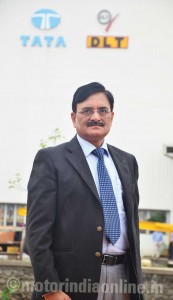
Speaking about the establishment of Tata-DLT, Mr. Gupta says: “Before Tata-DLT was formed, DLT had been selling its trailers predominantly in the Middle-East and African markets. In 2006, Tata started importing trailers from DLT to offer fully-built vehicles for some of its customers. Motivated by the excellent performance of the trailers and high customer satisfaction, Tata International and DLT entered into a 50:50 joint venture the same year.”
During the initial phase of the JV, Tata-DLT had imported CKD units from DLT Sri Lanka and assembled the trailers at a location in Pune. With the Central Motor Vehicle Rules (CMVR) norms posing a lot of challenges for the import of automotive parts and also due to rising logistics cost, the company was exploring possibilities to continue offering the best quality products, but at the same time, keeping the costs at sustainable levels.
The next big step forward for the company came in 2009 when TRF Ltd., a Tata enterprise, acquired the complete stake in DLT and commenced operations at its green-field facility in Pune. Earlier, in 2007, TRF had acquired York Transport Equipment (Asia) Pte, Singapore, a globally-reputed manufacturer of axles and suspensions through its subsidiary, TRF Singapore.
Deriving the right synergies as a result of the acquisitions, coupled with its technical know-how in the design, development and manufacture of a wide range of trailers such as flat-bed trailers, skeletal trailers, side-wall trailers, semi low-bed trailers, canopy trailers, steel-coil carriers, and other applications such as truck chassis carriers, Tata-DLT has established itself as a dominant front-runner when it comes to trailers and vehicle applications in the country.
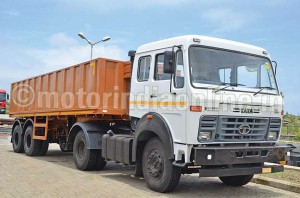 Having started with full import of trailers, moving on to CKD import and assembly, Tata-DLT products are currently 100 per cent locally sourced and manufactured to meet the requirements of CV market leader Tata Motors and other fleet operators, both in the domestic and overseas markets. “Our current Chakan facility went operational in 2011 and is spread on a land area of 13 acres with the possibility of further expansion in future. Our first trailer which was manufactured 100 per cent in-house was rolled out in 2007 at our earlier facility which was also located in Pune”, adds Mr. Gupta.
Having started with full import of trailers, moving on to CKD import and assembly, Tata-DLT products are currently 100 per cent locally sourced and manufactured to meet the requirements of CV market leader Tata Motors and other fleet operators, both in the domestic and overseas markets. “Our current Chakan facility went operational in 2011 and is spread on a land area of 13 acres with the possibility of further expansion in future. Our first trailer which was manufactured 100 per cent in-house was rolled out in 2007 at our earlier facility which was also located in Pune”, adds Mr. Gupta.
Quality to the fore
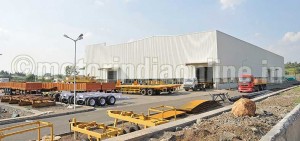 Tata DLT, with its state-of-the-art manufacturing unit and technology has been meticulously carrying out every stage of its product evolution be it design, development, manufacturing and quality control without any compromise on quality. Briefing on the company’s role in product development, he explains: “We use rolled beams instead of fabricated ones. The steel we use are special steels with high strength and light weight which also helps in increasing the payload. Our manufacturing process is entirely different from those followed elsewhere. Our products undergo complete quality testing before they leave the plant.”
Tata DLT, with its state-of-the-art manufacturing unit and technology has been meticulously carrying out every stage of its product evolution be it design, development, manufacturing and quality control without any compromise on quality. Briefing on the company’s role in product development, he explains: “We use rolled beams instead of fabricated ones. The steel we use are special steels with high strength and light weight which also helps in increasing the payload. Our manufacturing process is entirely different from those followed elsewhere. Our products undergo complete quality testing before they leave the plant.”
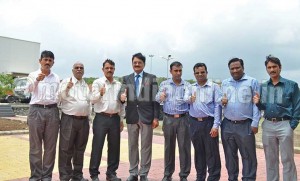
The company is highly conscious and equally stringent when it comes to the quality of aggregates used in its products and works with leading brands in the industry. It employs aggregates and components which have been tried and tested extensively in Indian market conditions, in order to be able to deliver a highly-reliable end product to its customers. “We use the best of aggregates and components in all our products. We get the complete kit of axles, suspensions and other products such as landing gears from York who manufactures them as per our design. For tyres, we use leading brands such as Ceat, JK and Birla and if customers demand radial tyres, we usually offer them JK”, he says.
Brighter days ahead
The Indian trailer market is a highly cyclical one showing strong growth and considerable contraction every three to four years. With the unorganised players having a majority share in the market, stringent regulations are expected to be enforced over the next few years with the hope of transforming the segment into a more organised one. 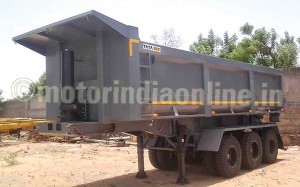 Despite the threat from unorganized trailer builders, Tata-DLT continues to sell a good number of units, showing that quality and reliability would certainly enjoy acceptability in any market, however cost-conscious it be.
Despite the threat from unorganized trailer builders, Tata-DLT continues to sell a good number of units, showing that quality and reliability would certainly enjoy acceptability in any market, however cost-conscious it be.
“There are nearly 15,000 trailers manufactured each year in the country of which only 20 per cent is contributed by the organised sector. Due to the poor market conditions, we were able to make only around 950 trailers last year, but in the previous years, we had crossed more than 2,000 trailers annually. Our plant has a capacity to produce 350 trailers per month and though we are not operating at full capacity at present, we are already seeing an improvement in the market. In the first quarter this year we have done more than 500 units and have good orders for the next few months as well. We are confident that the market will improve in the next six months”, says the COO.
With signs of growth in industries like mining, cement and ports, Tata-DLT expects it to reflect in the recovery of the trailer market. Mr. Gupta says: “With the opening up of the mines in Goa, Karnataka and Odisha and pick up of the steel and the cement industry, we foresee good demand for our products. 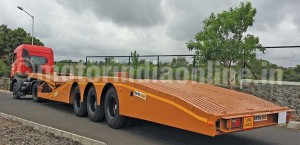 We expect the ports in the country to gather momentum where our skeletal and flat-bed trailers will be extensively used. With complete design and development capabilities in specialised trailers, we are leading suppliers of various specialized applications for the Indian defence.”
We expect the ports in the country to gather momentum where our skeletal and flat-bed trailers will be extensively used. With complete design and development capabilities in specialised trailers, we are leading suppliers of various specialized applications for the Indian defence.”
Since the unorganised segment forms a major portion of the trailer industry, Mr. Gupta feels with better knowledge of trailers, growing need for quality transportation and good service support offered by OEMs, the existing trend is likely to change. With the new government in place, there are plans for better roads and infrastructural developments.
With global retailers like WalMart, Tesco, Carrefour and others entering the Indian market in a big way, there is strict insistence on quality and efficient transportation of goods and products. Such developments are sure to have a positive impact on companies like Tata-DLT which are focused on raising the bar in the Indian transportation industry.